We heard the insider skinny on World Water Day conferences from a close friend who was there, and It cast the relationship between our Modular Water Systems™ and Water On Demand™ fintech in an interesting light… Is there a new way we can leverage America's regional rebirth and the developing shift to a commodity based economy? Find out in the replay!
Transcript from recording
Opening
Estrella: How would someone like me get involved with Water On Demand?
Riggs: Okay, you have a choice. You could get involved with OriginClear as a high-end investor. But I think what's better is to get directly involved in Water On Demand™ as an everyday investor. The minimum is only $1,000. Okay. It's early. Water is a stable commodity. The water doesn't go through ups and downs. It's early in Water On Demand's life so your opportunity is the greatest.
Estrella: When you say that, what do you mean?
Riggs: We launched Water On Demand in late 2021, so it was just the beginning of it. Now it's gotten more and more capital. We're starting to get our first pilot projects and we're also starting to do some acquisitions, buying other companies. So this is the time when it's all coming together to invest a small amount of money and have potentially an excellent return. And by doing it now versus later, you'll have helped us at a critical time. When we have to build the systems, we have to accumulate the capital to pay for these systems and also acquire the companies to make our job more effective.
Estrella: Got it.
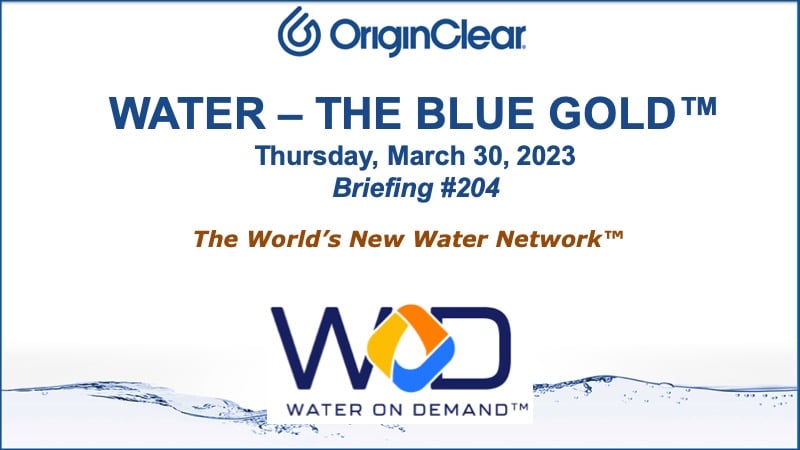
Introduction
Riggs: And hello, everyone, and it's a great pleasure. That was the interview that I did with Estrella Nouri on the. Back deck of my brother's place in Topanga Canyon in Los Angeles in December. Lots of good material there. And as you can see, Estrella, for all her beauty, is a very literate and thoughtful person. And it means a lot that she is on board with this program. Water — The Blue Gold™. So, yeah, Water On Demand is The World's New Water Network™. This is briefing number two 104. Let's continue here.
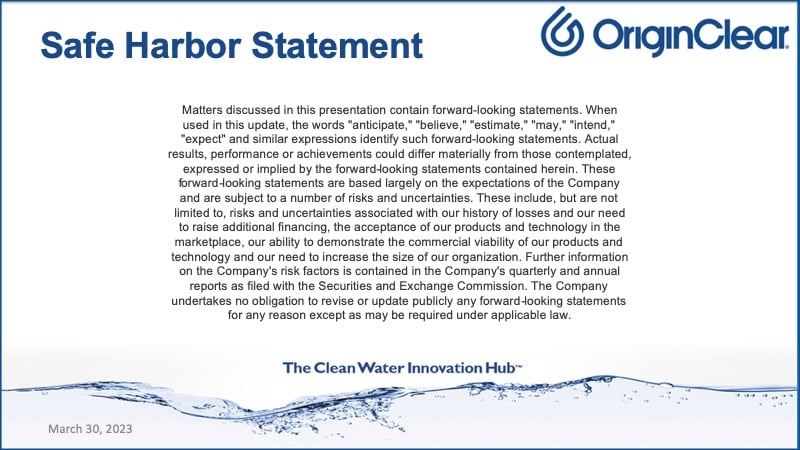
Obviously, the usual disclaimers.
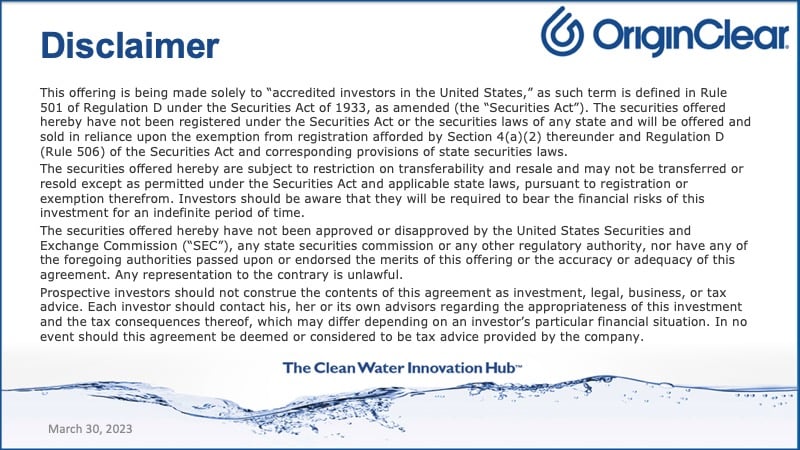
Report from Paula Wildermuth
And here's a report from my good friend, Paula Wildermuth. We knew each other from back in the day when she and I were rowers in Los Angeles. And she's going to have a report on the UN conferences that she was involved with during the week that we were doing our own events.
Keith Roeten asks, "With all the spills, leaks and disasters, are we deliberately trying to destroy our water supply?" Keith, I'm going to have a report on that in this briefing, so hang in there. All right. So here is Paula.
Start of presentation
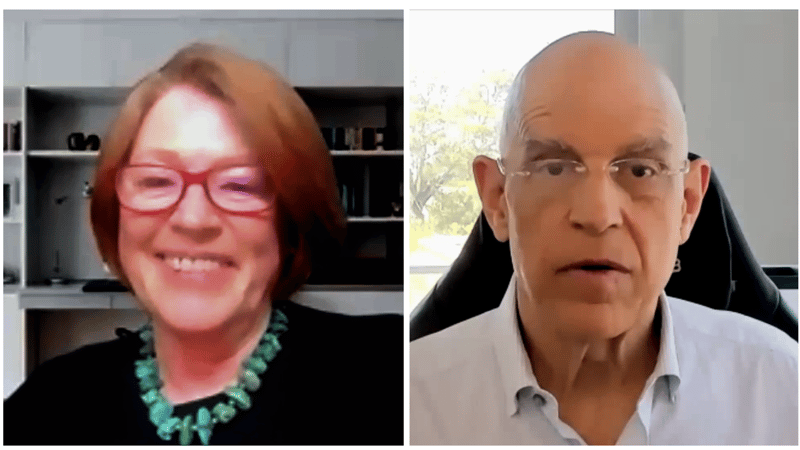
Riggs: Paula Wildermuth, it's a great pleasure seeing you on screen. We sweated together in Marina del Rey, rowing back and forth back in the day, and now you're on the East Coast. For family reasons. And I understand you went to the World Water Day events around the UN this week. So tell me a little bit about it.
Paula: Well, it was a wonderful opportunity to meet with people from all around the world and to get their perspective on the water crisis and to learn more about innovations that are happening, taking place all around the world.
Riggs: Well, so I mean generally, I think of this as sort of a, this UN is kind of NGO focused. Were there commercial players? I mean what was the mix?
Paula: Yeah there was, there were commercial players, there were universities, there were research people. Everybody in water I think was here from around the globe. And as you know, you well know, this was the first UN conference in 46 years, I think, that focused on water. The last one was in 1977, in Argentina and half a century. And water being so critical to our survival, it's the most important thing. And it's taken a back seat. And now...
Riggs: It's so true.
Paula: Now it's finally, come to, you know, sitting in front of the bus where it should have been all along.
Riggs: Wow. So what? Obviously, climate change is a major factor, but there's also the pollution caused by lack of treatment throughout the world. What were some of the big trends being discussed?
Paula: Well, how climate change has affected global, you know, everyone. Everyone's feeling the effect. Droughts to rivers out in California and all of that. I think the, one of the major themes and my interest and it's very, very much related to what you're doing is wastewater. And it is to me, like the Israelis, I believe that I read a statistic a while ago that almost right now, almost 99% of the wastewater is reused in Israel, mainly for agricultural purposes.
Riggs: Yes. Well, you know, one good thing about Israel, of course, is they have tight control of their economy. And also, you know, we built our sewage system 150 years ago, and that's a disadvantage after a while, right? Because the new, the newer construction has all that, those return lines built in, whereas we don't.
And this is why we so think that it's important to just go ahead and devolve the water treatment to the actual polluters, where they can do the recycling, wherever they're treating it, because how else are you going to do it? You're not going to redo all of our infrastructure. You're not going to happen.
Paula: No, that is totally impossible. And I think treating it right at the source is just so important because then you have it right there to reuse for other purposes. But for agriculture or one of the industries that I have been doing a lot of research on is the fashion and textile industry. They are one of the biggest polluters. Um, water, water users and all of these chemicals and dyes. A lot of it, I read a statistic, I don't know, and it was from the UN and so I'm going to, I'm going to believe the statistic. 80 to 90% of the wastewater goes untreated into waterways.
Riggs: So true. No, no, it's mind bending. Now we do better in the US and Europe. But, you know, one of our great supporters is based in Puebla, Mexico, and he treats water for not the Mexican companies, but the American companies in Mexico, right? So, because they have a mandate, they have a mandate to treat the water. So he's working with the state of Puebla to strengthen the laws there because there's so much, you know, escaping the laws going on and a lot of, you know, corruption throughout the world. So how do we do it?
Well, you know, I think, we believe that it's got to be a carrot and stick approach. In other words, how is it going to be attractive to the local business to do their own water treatment? And again, it comes back to it's the money, stupid. If they don't have to come up with the cash up front, that's important. And it's got to be the right sort of pocket water treatment technology so that it's a corner of the brewery and they're fine, right?
And importantly, they've got to be able to recycle so that their water bills go down, things like that. So all these things, I think are going to get us traction. But there's no doubt that's going to start in the US. I mean, that's, we have a lot we have a lot of things wrong with the US, but we are conscious of the problem, I believe.
Paula: I believe so. And the more and more we see large cities like Flint and the train wreck in Pennsylvania, Ohio, excuse me, that just, you know, just polluted all the waterways there. I mean, it's total environmental devastation in that area.
And I just think that we are right now, we are very conscious of water and I think we need to make everyone, I think it should be this water should be brought into our educational system and the kids should learn from a very early age about water and that it's a finite resource and the scarcity of water.
And understand that the children in Africa who walk two, three miles a day to get a jug of water that's not even clean, they really appreciate water and understand water. And we need to have a we just have to have a change in our mindset about water, about our whole environment, but in particular water.
Riggs: Well, you know, it's a funny thing because, you know, I talk to a lot of people who are interested and they don't lack for enthusiasm. They lack for what do I do? What do I do? They're not, nobody's handing them any like, "Well, try this." No, it's like you just stay there. We'll take care of everything. It's very. It's very parental, right?
But we need to harness people to help out and to drive it. And that's part of why, you know, we now, as you know, opened to crowdfunding so that anybody can invest in this new capital for these water systems. So, you know, all in all, I find people enthusiastic if they're given the angle, if they, you know, what do I do about it? And that's super important.
Paula: You know how everyone is, has been talking about the carbon footprint. We need to have water footprint.
Riggs: I like that.
Paula: Water footprint, absolutely. I think that I, like for one cotton t-shirt, 800 gallons of water. When you, when you think about water in those terms, what your water footprint is, it just makes you have this utmost respect for water and to rethink like, I don't really need that t-shirt, you know, I don't need to have ten t shirts. You know, it's...
Riggs: Theoretically if the garment producer properly recycled, then fine, you know, keep reusing the water. It's closed loop and you get a loss. You get, I don't know, ten, 15% loss each time around. But still, you would have something I think, that was more sustainable because, you know, we see, for example, you know, in California, the population is being told to take shorter showers, this and that. But meanwhile, 90% of the water use is by industry and agriculture, especially agriculture. And it's like, guys, avocados in the desert? Hello? You know, you don't need to do that.
Paula: I know. Exactly. Exactly. So it just needs to be a whole, everything needs to change. There has to be a whole shift in mindset and one of the things that, several of the sessions that I went to, there was an emphasis on, okay, we've been talking about this. I mean, the scientists and researchers know the water scarcity and some people know it better than others. But we need action. We need action right now. And it's, there's no time to lose.
It's like, you know, UN Secretary Antonio Guterres, said, you know, we need to, we're not doing enough about reducing our greenhouse gas emissions. And, you know, we're, our foot is on the accelerator to, we're on our way to climate hell. You know, and it's the same thing with water. I mean, we need, we need action. We need action right away. And water is such a, it's huge, it's so complex.
And, um, at a session that I was at the other day, I was sitting next to an engineer, and we were talking about capturing rainwater and we were talking about water law out in California, and we're talking about Colorado River and Lake Mead and all of that. And he said that there's a law in California where some people cannot collect rainwater because, there's a law against it, because they felt it would divert water to the Colorado River. Can you imagine? I mean, I have to I have to do some research on that. I mean, you know.
Riggs: Okay. So, we were based as you know, we were based in Los Angeles for a long time. And I heard that at the time. And the good news is the Department of Water and Power has been liberalizing that. Um, so but it's also true that in Los Angeles you cannot dig your own well, in the city, Los Angeles. Because it's a monopoly. All the water rights are owned by the Department of Water and Power. So there's kind of a, it's very authoritarian. Very authoritarian. And I think that that's a problem. And again, by getting more and more players into the water treatment space, we're actually going to make it easier to balance out that authoritarianism. Right.
Paula: Yes, and I was at a, yesterday, I was at an online session with women innovators, and there was a person there that is doing something very similar to what your company is doing. Um, a fee for service for water that takes, I believe it's on site, from what I understood from her description, that, you know, they treat the wastewater right there on the premise and, fee for service, and so that is, that is really a great business model.
But what I, when I think of your business model and your company. I think it's really, it's very attractive to agriculture because that is, as you know, farmers are hard pressed. I mean, most of the people, there's so many people in the world that do not realize what farming is all about or where food comes from. They just don't, they think, they go to Whole Foods and that's where it is. They just ship it in, you know, from someplace.
They don't understand how difficult agriculture is and especially now with climate change, but and how water intensive it is. And to have a drought and not have water to depend on or the cost, the driving, water is getting to be so, so expensive. And so how invaluable having wastewater that you can use for irrigation is just it's going to be a game changer.
Riggs: Well, that's I love your point of view. And you know, it's true. There are other players starting to pop up because it's becoming a thing. And it's you know, we it's one thing to be a pioneer because in 2016, I was a pioneer and people were like, "Huh, what? Decentralized water, I don't get it." Now people get it. There's more and more players and that's a good thing. We want more competition as well. And so I'm really glad to hear that. And I just, I just love what importance you put on it. I love that you've made it your mission and, you know, Paula keep, keep supporting us. I love it. Thank you so much!
Paula: I like it. And another thing that they talked a lot about, many sessions addressed, and this is on a global scale for many different things, but financing. And that needs that needs to be restructured and everything. But what I think is going to be very attractive in the agricultural space for, or any space really, but in agriculture specifically for your company, is that you actually build, you build the infrastructure and you bring it there. They don't pay for that. See, that's kind of that is very clever. That is very clever.
Riggs: Well, it's like so many things. Covid was a big game changer for us. Covid forced us to look at our business model and to go, wait a minute, it's too fine a net. If you make everybody pay up front. But if you can open it up, it's just like when Ford first started selling cars on installment that made cars ubiquitous. And I think we need to do that. So we're connecting the two, the technology side — the solution side with the finance side, GM — GM financial kind of concept. And people are getting it. It's super, super exciting.
So, Paula, let's stay in close touch. I appreciate it and keep doing that, that the good work and it's so good to hear that they had that conference. As I was telling you before we were recording this, we're going to get more and more, make it more and more an event each year and hopefully tie it in with the UN again, make it an annual thing and tell the world.
Paula: Yes. Good, good, good. And I hope you, hope to see you at more Water Week conferences. There's one coming up in Washington, DC, I believe in September or August, September, sometime in the fall.
Riggs: Let's do it. I want to see you. Very good. Well, Paula, I'm going to I'm going to wrap up the recording now. And I appreciate your report from where it was at this week.
Paula: And I'm sorry I didn't get to see you in person, but it's really great to connect.
Riggs: Well, we got we got Zoom, right?
Paula: We do.
End of presentation
Riggs: So that is that. And that was a very good story. As you can see, Paula, besides being a longtime friend, is also very much of an advocate. And I think a lot of our story came through there. Before I go on to play a really interesting excerpt from this podcast that was done, it gets into my own background, which may shed light on the nature of our culture and so forth.
Audience participation
Marcus Walker, "Thank you for giving me the opportunity to buy my 200 shares in your company. I truly believe in what you guys are doing, especially how the water system is out here in Long Island, New York." Keith Roeten says, "She is right, Paula. No time to lose." Darrell Polston says, "Colorado cannot harvest rainwater. Literally, if you're in Colorado, you can't harvest rainwater. How weird is that? Wells in urban zones is based on polluting groundwater with human waste, cholera and dysentery." Exactly. You have to be very, very careful about purifying well water. And he also says, "Rainwater falls under the Clean Water Act." All very true. All right. So here we go with the next quick excerpt. And I think you'll enjoy this.
Playhard Podcast
Start of presentation
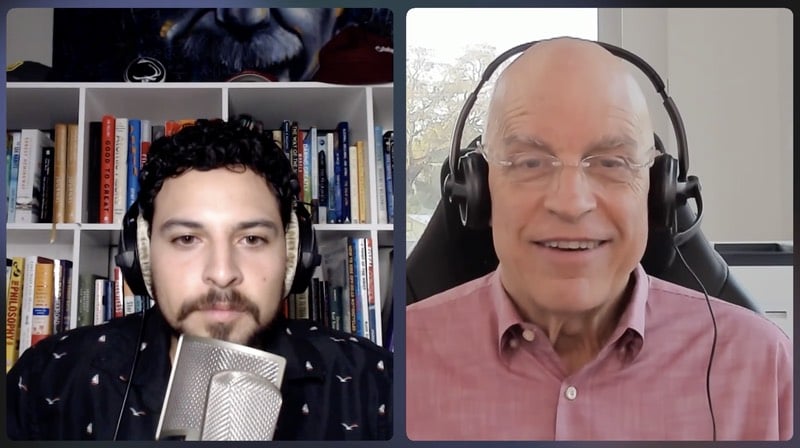
Armand: Riggs, you strike me as an adventurer type, as someone who just likes to go out and just see where the wind takes you. I mean, you just left to be a cook in Colorado. Five star restaurant. Of course you were a ship captain. Do you have any other kind of memories or stories of a time like that where you just said goodbye to everything for a short period of time?
Riggs: Well, like everyone in LA, I worked for a year in film, right?
Armand: Yeah, of course.
Riggs: Of course.
Armand: Either film or music, something.
Riggs: Exactly right. Because I've got a brother. It's good to have a big family. So I've got five brothers. And so one of them is, to this day in film, and a very good editor and director. And he and I was like, I want to do film. And this was the period after I had given away my New York business. And I was doing all these different things, including eventually, the wine thing, the wine thing and this and that. But what I really wanted, to taste this filmmaking thing and I got involved. I loved it. But I tell you, I have never worked as hard in my life as on film. These people have brutal schedules. Oh, my gosh. I worked on an American Airlines commercial and we filmed we shot enough 35 millimeter film for an entire feature film. 135,000ft of film for a 60 second commercial.
Armand: Wow. What?
Riggs: It was, we went, well, we went to London and we went to Paris. We went to Nice. And, you know, it was one of those American Airlines commercials with the plane shadow flying over.
Armand: Yeah. Oh, so they had to get it just right. The timing, I'm guessing they had to get. Yeah.
Riggs: Right. Well, they had to, it was one of these multi. So like you're in Italy, you're here, you're here, you're here. You know flashes. Well, each of these flashes, I was the production manager and I got so that you know, I was never sleeping. The only drug I wanted was sleep. Like six weeks of, you know, 4 or 5 hours a night. It was insane. But at the end of the day, you have something pretty cool, right? So, I loved that.
It's just that, the problem is, is that for me, technology was a magnet. Eventually, I fell back. I was trying to do other things than technology, and eventually, I just, I'm made for it. And I think the reason is that you can disrupt so much with technology. It is such a lever. Like we talk about climate change, like climate change is not going to be fixed by, you know, making farms have less nitrogen or whatever. No, it's going to be done with technology, technology.
I'm very much a fan of Elon Musk, of course, because he understands that we need to have technology disruption. And so I love changing things with fundamental technology breakthroughs. And that's finally what I'm privileged to do with this OriginClear company. So much fun.
Armand: Yeah, I've always said Elon is kind of like the Michael Jordan of entrepreneurship to have done so many companies. Today, currently, I don't know. I think he's like CEO of four different companies. Maybe. I don't know. I can't count what he's doing, but he's doing so much, all very disruptive technologies in very interesting spaces. And it's just very impressive to see how one guy can be, you know, CEO of all of that, like how he can manage and juggle all those different roles.
Riggs: He's amazing. He's like, Steve Jobs is another guy like that, too. I mean, these people, I think they know how to compress time. You know, you've heard about "Jobs time." That literally, in company's.
Armand: Like the poison field?
Riggs: Yeah, exactly. And it is very true that you, a good CEO will bring about this can do thing about deadlines and things you've got to get done and and getting people to start really speeding up. It's something that I study a lot in terms of what I watch Elon Musk go through. I watched very closely what he did with Twitter, and it's a combination of changing the culture very visibly from a communication strategy as well as getting into the code and fixing the organization itself, both. And he's, you're not supposed to be a CEO of more than one company, but he pulls it off.
Armand: Yeah. It's almost as if it goes against what Bill Gates and Warren Buffett, well, I don't know if he's not focusing, but that was Bill Gates and Warren Buffett famously had that encounter together. And they both said focus is the most important thing. I guess I misattribute sometimes focus to only do one thing because I've always been someone who, like, handles many different projects. But I think what it is, is if you can focus on the task at hand or what's important, what you need to move the ball for that day, then that's important. But if you're just kind of like, I don't know, one foot in, one foot out every day for all your projects, you're not really going to do much.
Riggs: Well, his focus, I think, is on, he is really about inventing a future we can live with. And that's his focus, right? His you know, his goal for Twitter, for example, really is that he wants to have a proper marketplace of ideas and with a minimum of restraint. And that's more workable, in my opinion, than this heavy handed censorship mode that started to, you know, that sort of grew almost unrestrained. And that's why he's also you know, I drive a Tesla and the UX, the user experience of being in a Tesla is amazing you know. Literally, I park my car and I press a button that keeps it cold while I'm going in there and doing whatever. Right? How cool is that?
Armand: That is pretty nuts.
Riggs: That's great. I don't have to worry about the groceries getting warm. It's like, it's all good. It's all good.
Armand: Yeah.
Riggs: It's great. Yeah.
Armand: That is pretty nuts. I didn't even think of that. Um, yeah, well, Riggs with that, I just have a couple closing questions. Something to get to know you a little better, and then we can wrap this interview up. So, yeah, let's get into it. Number one, what kind of music do you listen to?
Riggs: That's a really good question. My, I have to say that I like all kinds of questions. For many years, I liked house music. And the, you know, it really depends if I'm trying to work or if I'm listening. Right? So for work, you want more of the euro kind of dub or house type music, stuff like that, which doesn't distract you too much for just. Uh. I've noticed, for example, that Spotify does a great job of grabbing stuff for me that is kind of a good groove and I'm listening to performers.
I would say that, you know, present day, what we used to think of as alt rock today is more of like an esoteric global pop kind of music. It's very, it weaves a lot of cultures together. It's got vocals, but it's also very often very mesmerizing. I like that kind of music. So yeah, I mean that's, that's in general, I think of music as something that puts me in a certain frame of mind and makes me think of interesting things. And that is usually current fusion, you know, jazz, pop, rock type music.
Armand: Yeah, I like that. Puts you in a certain state of mind. I think that's, that right there, I'd say is the key to intentionally listening to music. Sometimes we just have it in the background. Maybe you are studying or doing work and other times it's like you want to listen to something for the feeling it brings. At least that's something I like about music. Yeah. So what kind of movies or TV shows do you like? Anything you would recommend to the audience out there?
Riggs: Well, I have to say that my wife and I have totally different tastes. Currently, we're watching Sanditon, which is a great little series that, again, I like period pieces because it's fascinating, you know, But my own druthers is I get very geeky. For example, I watch the ancient Apocalypse series on Netflix.
Armand: Yeah.
Riggs: Which was fascinating. And like, okay, the whole idea that there was a reboot of Civilization post this calamity called The Younger Dryas was to me fascinating. There is also I got into an anime saga, which that was. There was. What was it? Yeah. Vinland, Vinland saga was a manga series that I don't know if they've gotten into a second, but Vinland saga. It's about really the period when they were just getting to know the North American continent and they were starting to trade back and forth. And it's this whole world in general. I love, you know, historical fiction. And, you know, I thought that was a super cool show.
But, you know, frankly, I have to tell you, Armand I read, mostly read. I read, read, read, read, read, read. And I read everything from, you know, the other day I read Through War and Peace, and then I'll do science fiction and fantasy. Then I'll do some some historical novel. I just, you know, I'm just omnivorous when it comes to reading. And I think it just gets me outside of my workspace. It makes me more. I open my antennas better if I just read any kind of wacky thing, I find myself reading a young adult book. I'm like, What am I doing? But it's just stuff that that just gets me out there and that that way I don't have this obsessed, narrow focus in my life, which is, I think, very.
Armand: No, I get that. I mean, you did a great job. I mean, my third question was going to be, what books are you reading right now? So you checked that one off. But no, I feel like, so something I do is I play music, I play bass in a band. And I was asking someone who was much more experienced than me, like, how do I improve my playing? Like, how do I become a better bassist? And he said, Listen to the most random and different types of music and just try to pick apart like the pieces you like in those, in that music.
But I think the same could go for reading or so many different, like I think what he was just saying is keep an open mind with this art form. But it could go with reading as open mind with your thinking because a lot of it's like the kind of content we consume, is kind of the stuff we think about. If we're just in this vacuum chamber of reading and watching videos of all the same stuff we already know and listen to, you're not really going to be learning much. You're just going to be confirming everything there.
Riggs: Yeah. And you know, every Thursday night I do a CEO briefing. We just did this weekend, day after tomorrow, we'll have our 200th episode. And in order for it to be interesting to people, it helps for me to have my tentacles out there. And so I subscribe to a bunch of these telegram channels that are sometimes way out there. But what I'll get out of it is I'll get nuggets that relate to the economy and sometimes to water itself. And it informs my, my, my briefing to my audience that I've got, "Hey, guess what? There was this interesting thing that happened with the cost of eggs," which was a recent thing, right? Eggs took off.
So, you know, by scanning through what is mostly incredibly wild stuff, I get the occasional nugget that I can reuse, and I think that's important, too. You've got you know, it's very important not to be doctrinaire, right? I am the left. I am the right. I am this. I am that. Because there's truth woven through all of these viewpoints. And so if you just keep a really good outlook on all the media channels and then you can just pick what you want and you know that, "That was BS, I get that, that's BS." But you get the good stuff.
Armand: How do you sort between the BS and truth when, because it sounds like right now what you're doing is trying to take in the world in an unbiased lens, and a lot of these channels tend to have a certain bias and some truth is woven in with some bullshit. Like how do you weave or how do you sort through all of that?
Riggs: Well, it's you're right, it's hard. But I think after a while there is a bullshit meter, right? After a while you go, Nah, that that's just somebody pushing an agenda. Right or left, whatever. Right? Yeah. And then of course, there's always commercial angle behind these things too. But when, for example, I see the producer price index in Germany just skyrocket. Well, that's a fact. That's a stat, right? Yes, it's an actual thing.
Now, what somebody's opinion of it is, is another thing. But I can take that and go, okay, here's what's going on in Germany with the producer price Index. What does that mean for the Germans? And what does that mean for... I'm a big fan of Peter Zeihan. I don't know if you've heard of him. He is a geopolitical speaker and his book, The End of the World is Just Beginning, I think is what it's called.
And what he means by that is we're in a deglobalization process where we're going to go back to regional and he has very strong opinion about the North American region being a future very powerful, will go through a very powerful renaissance as we bring back manufacturing to America. The next 20, 25 years are going to be a huge boom and it'll be fresh tech. All these factories that will be built, we'll have the robots, the AI, the high speed computing, all that stuff built in and well, of course.
And why was that important to me? Because this can be so fast. We'll have to co-locate the water facilities with those businesses, and that gives us our strategy. Exactly. So that informed me tremendously when I listened to Peter Zeihan being interviewed on Joe Rogan. He freaked out Joe Rogan because a lot of it was quote unquote bad news. But there was good news in it about our access to Mexico, which is a wonderful labor pool, educated and cetera. And we just have a great future. And so out of that, I extract a strategy and that's what you've got to do in the end is how does this make sense for what I'm doing on a day to day basis?
Armand: Okay, so so it sounds like what kind of how to sort and filter through all of this and then turn it into something that you can use for a strategy would be, number one, you take an objective stat such as egg prices are going up and then you get curious about that and you try and find out from different types and different pools of resources. Why is that? Because I feel like a lot of different different people are going to have their point fingers somewhere else and whatnot. But like you start to see a common thread, you start to pull some truth from all that and then you can use that into your advantage somehow 100%.
Riggs: And you know, there is such a thing as, as, as trusted media figures. I think. I think Joe Rogan in the main I disagree with him on, but he in the main is a very dispassionate listener. I like people who like you who listen, right? That way, they're less likely to have a bias because they're listening. They're not talking, right? And he does a great job of listening. I've I've had a lot of fun, you know, sorting through his stuff. And I strongly recommend Peter Zeihan to you. The Joe Rogan interview. You'll you'll you'll enjoy it.
Armand: Yeah, I'll check it out. And I appreciate that. I've actually been working on a book on active listening. And what I've noticed is one of the most important. So the first section is just the mindsets that a lot of strong listeners I've noticed have. And one of the most important ones really is, is coming without. Even if you have to suspend your biases or everyone's got their judgments. But when listening to someone coming in judgmentally has no it doesn't serve the listening purpose.
If your goal is to understand that person, such as in a podcast, like I'll admit, I'm not always the best, you can ask my parents, you can ask my girlfriend. I don't always listen the best, but when it comes to podcasting, I know it's like there's a certain level of I have to take everything out and just show up empty pretty much and just willing to ask questions. And I think that's just my philosophy on listening. And so far it's worked so well.
Riggs: And doesn't that make life more interesting because you get to hear so much good stuff.
Armand: Yeah, Everyone's interesting when you when you come in with nothing.
Riggs: Amen.
Armand: All right, Riggs thanks for coming on the show. This was a super awesome interview. I was glad talking to you.
Riggs: Armand, it's a pleasure. And let's check in six months or a year and see how we've both gone.
Armand: Yeah, we can even, someone suggested this, one of my previous guests and I'm trying to do this more, is a year later doing a "How are they doing now episode.:"
Riggs: I like that.
Armand: Yeah.
Riggs: I'm all for that. So let's do it. And it's been such a pleasure Armand, it's a great experience, because you know, you get asked a lot of questions and it actually makes you think so I appreciate that.
Armand: Yeah, I'm glad.
End of presentation
OriginClear at NeueHouse in NY
Riggs: There we go. That was really penetrating interview Armand got last week. There was where he was, he got to the bottom of my dad being Don Draper, the Jon Hamm figure in Mad Men and all that good stuff. It was it was a lot of fun. All right.
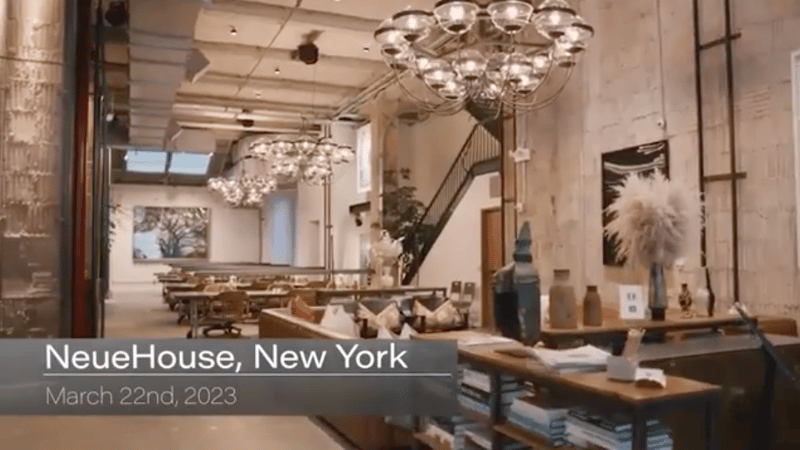
Riggs: Now we have a quick, quick short piece with the highlights from last week that I'm going to play for you. And then there's going to be some really interesting who'da thunk type news. You're going to be amazed. Here we go.
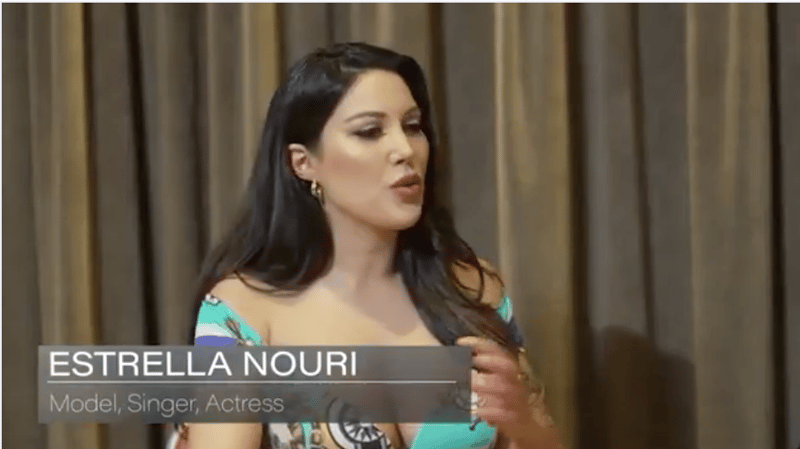
Start of presentation
Estrella: As soon as I found out that 89% of water pollution comes from business and agriculture, and we're just the 11% of that, I was like, "Wait a minute, that's not what I was taught." So how does Water On Demand come into play? And that's when I realized that Water On Demand has these modular systems that are put into companies, and usually companies want this system, which they can't afford because it costs millions and millions of dollars, Right?
Ken B: In any case, hundreds of thousands at the very least, which a small business can't, can't afford.
Estrella: Of course not. This is a movement, and I have to be a part of this.
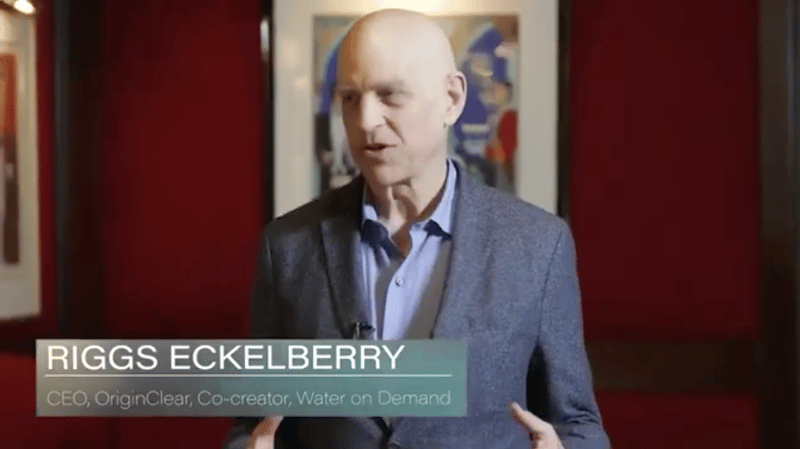
Riggs: We are talking about a dire situation in America where since 1961, over $1 trillion of estimated deficit has accumulated in the water infrastructure of our country. So we see problems with Flint, Michigan, Jackson, Mississippi, Compton, California, and even affluent places like Fort Lauderdale are in a mess. Why? Because 90% of all water demand is by industry and agriculture, and the people are being shortchanged with that 10%. Basically, the system is overloaded.
What's the solution? Nobody's going to write that trillion dollar check. We know that it's going to go elsewhere, but not into water. Basically, we need to unload the system. We need to take the businesses off of the grid. They're already being encouraged to do so because cities are saying you can't take it. You're going to have to truck your water to the next county. All kinds of horror stories. So there's an opportunity here with $1 trillion addressable market.
Now, in 2020, Ken Berenger and I analyzed how come we couldn't go faster and we decided, "It's the money, stupid." So if we can pre-fund these systems and people just sign on the dotted line, then a big friction point goes away. And so we created something called Water On Demand, which complements this decentralized miniaturization technology we call Modular Water Systems™ tagline Water System in a Box™, right? It's all miniaturized. So now this combination is being put together because this is an open conversation.
We don't get into details too much, but we have very interesting plans for this combination. And what's great about it is the current revenue graph in the forecast, which I can share with you, is in favor of Modular Water Systems, right? But then if we if we combine the two units, the out years 2024 and onwards are sharply in favor of Water On Demand. Why? It's financial. It's money. Water On Demand is "GM financial," Modular Water Systems is GM.
End of presentation
So that gives you a little bit of a our strategy here relating to the synergy of the two systems. Before I go to the next story, Paul Fetcher recommends Ray Dalio, who I've featured on this show before. Amazing, amazing, amazing guy, founder of Bridgewater Capital. Paul says it's the best book he's read in the last year for sure. It's called "The Changing World Order." And it's a cautionary tale. I agree. Ray Dalio is one of the top thinkers, and I was keenly interested in gosh, it was a couple of years ago that I actually featured one of his books or articles, and I should do that again. All right.
News on TikTok
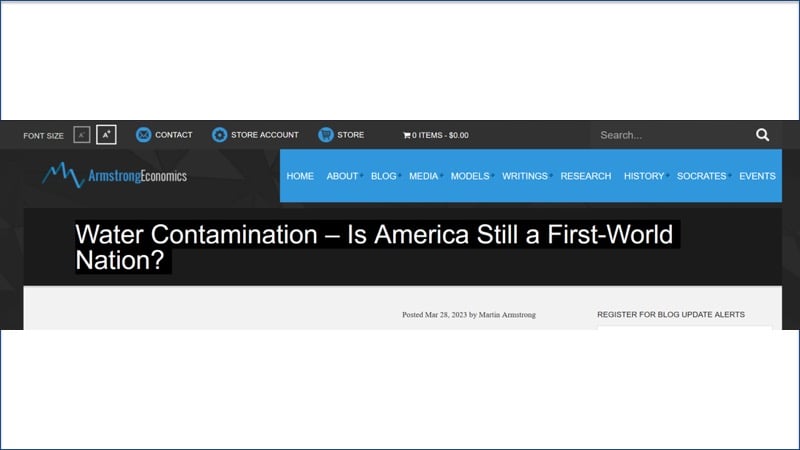
This is amazing. Here's a couple of tiktoks. Armstrong Economics, which you wouldn't expect them to put tiktoks on their page, but they did. Water contamination. What's going on? Well, here's what's going on.
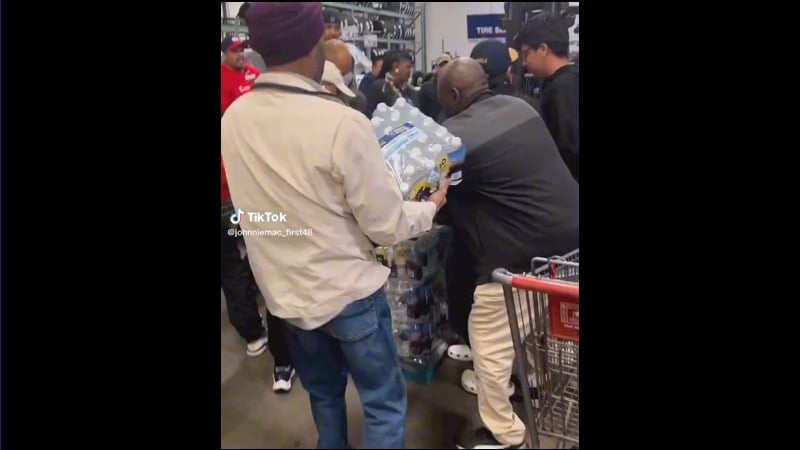
Start of presentation
Tiktokker 1: This is the foolishness that's going on over freaking water. This is absolutely ridiculous. You get one and I'll get, oh, my God. It really is like they literally fight over water.
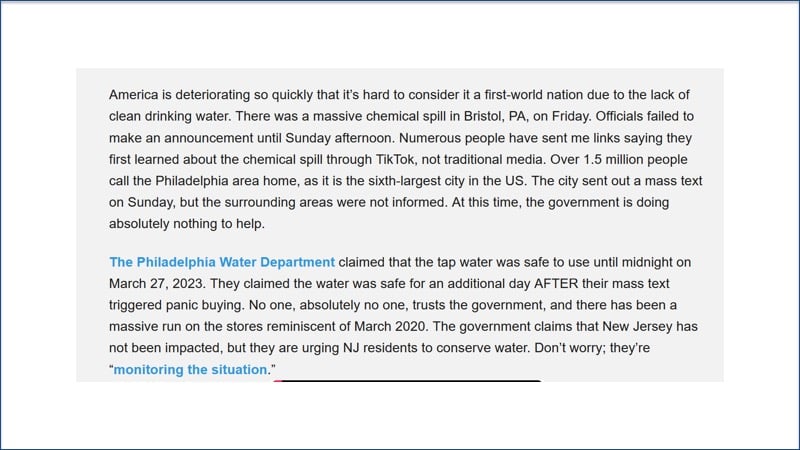
Riggs: Philadelphia Water Department, There was a massive chemical spill in Bristol, PA, and once again, it was kept on the quiet for some reason, and people learned about it through TikTok. And finally, Philadelphia Water Department was saying, it's fine, it's fine, it's fine. And then like, uh, no, it's here, it's here. Another Tiktoker.
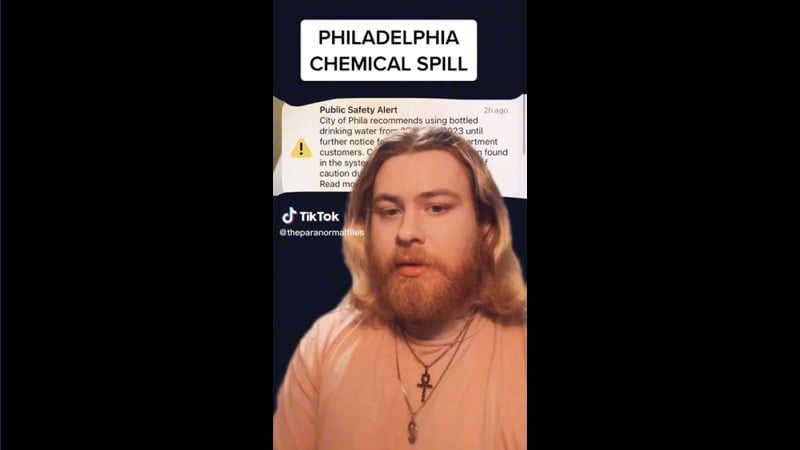
Tiktokker 2: So I live here in Philadelphia, and just a couple hours ago, we got this citywide alert that said you cannot drink any water that the city provides you. This absolutely came out of nowhere and everybody is freaking out in the city. It's not being reported on. It's kind of crazy what happened. Apparently over 8000 gallons of hazardous materials spilled into a creek, which feeds into the Delaware River, which is where Philadelphia gets its drinking water from.
I'm going to take you real quick to walk with me to our convenience store right here to see if there's any water left. As you can see, everything is already completely gone. I was actually in here like two hours ago and it was already gone. All they have left is flavored sparkling water. I even used the service GoPuff to try to order water online three hours ago. Right when this happened. And I still haven't gotten any water yet. I don't know if I'm going to be able to get any.
It's interesting to me, considering that a massive pipe bomb was found behind a church in Philadelphia a month or two ago and it was right next to a set of train tracks. This coming shortly after the massive train derailment in East Palestine, Ohio. And yeah, I don't know what's going on here in Philadelphia. This is definitely a weird and freaky situation to not be able to even drink your water. But I don't know. Let me know in the comments section below. What do you guys think happened and what do you think is not being told to us?
End of presentation
More Toxic Chemical Spills
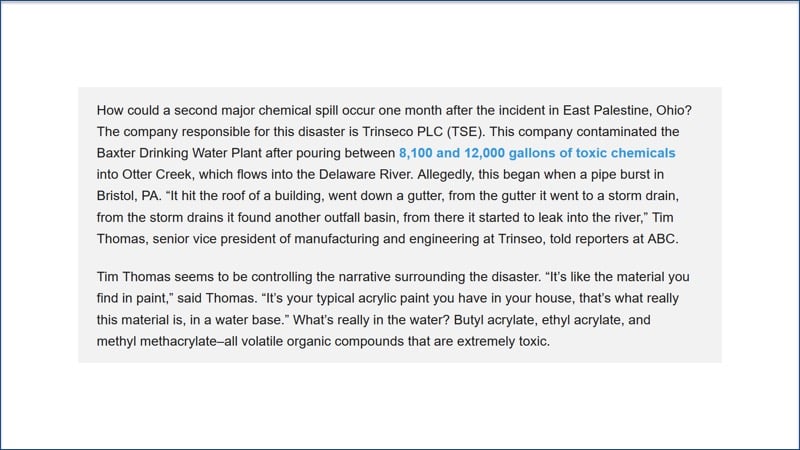
Riggs: So a second major chemical spill literally in the same part of the world. The company is Trinseco. Big pollution, it's literally the stuff you find in paint. It's nasty, butyl, acrylate. Ethyl acrylate. Methyl, methacrylate. VOCs, volatile organic compounds. Tim Thomas is trying to control the narrative here. Well, horrendous stuff happened in East Palestine and no transparency in PA either. And so now the US Coast Guard is, you know, is trying to handle things in East Palestine. Now there's PA.
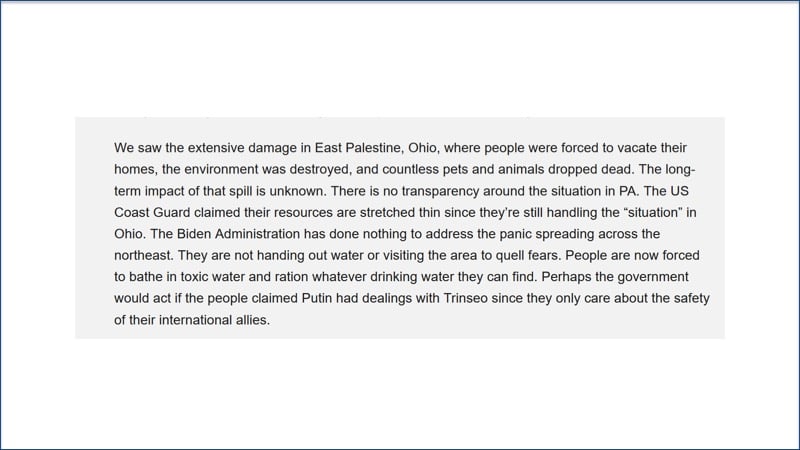
The Biden administration is completely hands off. This is crazy. Ridiculous. Perhaps the government would act if the people claimed Putin had dealings with Trinseco, since they only care about the safety of their international allies. Well, anyway, I'm not going to get into geopolitics, but this is, you know, it's it's getting real, right? This is getting real.
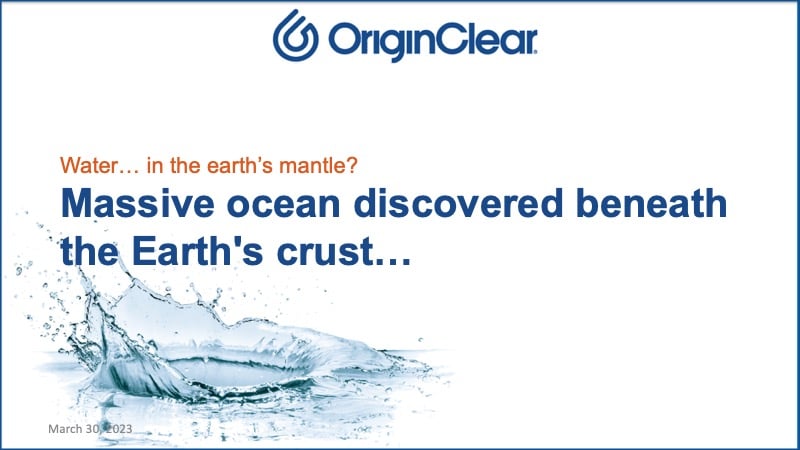
And before I go on to the next story here. Darryl Polston says, "I've read some of his shift in financials and the shift will place assets over other types of financial instruments." Exactly right. Ken and I have been basically, we've understood that we're moving from a currency based financial system which is falling apart to a commodity based financial system. And what will come out of it will be exchange instruments based on commodity baskets. Water is one of them. I'm going to tell you a little bit more about that in a bit.
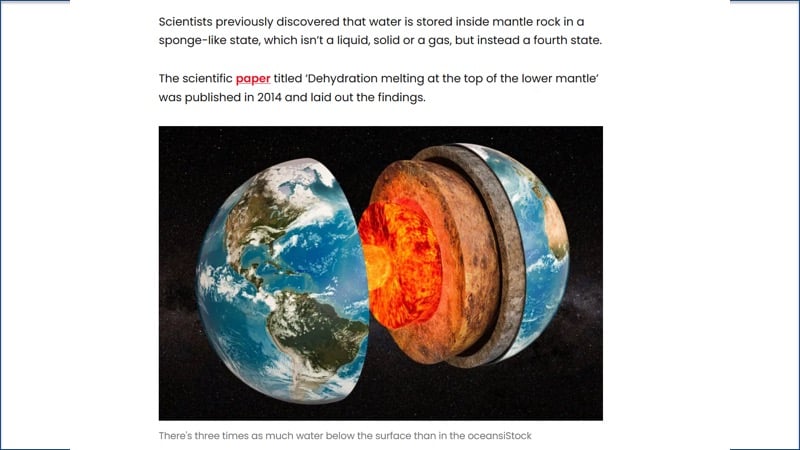
But first of all, did you know there's a huge amount of water beneath the earth's crust? Yes, yes. Massive ocean discovered beneath the earth's crust containing more water than on the surface. So apparently there is water stored in a sort of a sponge like state that neither liquid solid or gas, but instead of fourth state. Kind of interesting. And it's called ringwoodite. Now, here's what's interesting. If the rock contains just 1% water, there is three times more water under the surface of the earth than there is in the oceans on the surface. Pretty fascinating.
Virtual Water
Next week, I'm going to feature a story that I just didn't have the time for tonight, which is something called virtual water. And what's happening is other countries, like Germany, buying Arizona water to grow stuff and Arizona going, "Wait a minute, we got no more water." Fascinating story. It came from my brother, co-founder of this company, Nicholas. And I want to do it justice because it is establishing a world market, but it's also a predatory market. And that's where we really, really need to help out.
And Brian Hallinan says, "Train derailment in Minnesota as well." Basically, infrastructure has been neglected for so long energy, rails, roads, water that we're seeing these things blow up. No more complacency. We can't have that anymore. It's over. All right. And with that, I am going to move to the freewheeling discussion with my friends.
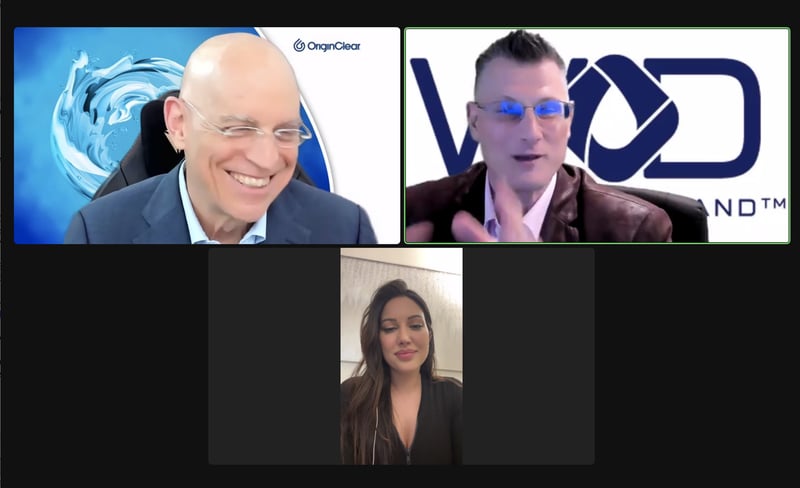
Freewheeling Discussion
Riggs: Hey, guys.
Estrella: Hey.
Ken B: Hello. Hello.
Riggs: So fascinating stuff, huh? Really interesting stuff.
Estrella: Absolutely.
Ken B: You know, you wonder if the cable, 24 hour news cycle, makes us more hyper aware of the disaster that our water is in. Or is it really just getting worse? I, you know, I know that a train derailment in Minnesota didn't make, you know, news in New York when I was growing up. I understand that now it does, right. But I still have a feeling that what you said is more accurate. This is a consequence of decades of failing infrastructure and the chickens coming home to roost.
So when a train goes off the rails and burst into flames and spills chemicals like, you know about it. We don't know what's going on beneath the ground in the pipes that are delivering. You know, we don't know what's intruding into that water. And it's a scary feeling. Right? You know, you saw people, what, fighting each other over a case of water. Okay. Imagine. Imagine if it was on a larger scale. Right?
Riggs: Right.
Ken B: I've always, I've always believed that we kind of formed this idea, I believe that there was a certain amount of divine intervention, right? It's just because it was like, boom. Right? And I believe that we kind of created this idea to help scale this thing at a time when it wasn't just a great story, you know what I mean? And oh yeah, that's a very cool, cool model. Cool opportunity. It's literally coming at a time of urgent vitality, you know, at a vital moment, right? An urgent moment. And these types of news stories kind of reinforce, you know, that inkling that I've had.
Riggs: Well, we had the, you know, we were coming up with this in the early days when people were buying literally pallet loads of toilet paper from Costco. And so it was, we were worried and rightly so, because the...
Ken B: I still have a storage room full of it. Thank you. Thank you, honey.
Riggs: But you know what? You can live without toilet paper because newspapers do a decent job. But the water. Sorry.
Ken B: Exactly right.
Turbo Effect
Riggs: So I still have a couple flats of water here, you know, because the emergency has gone away. But any day now the central system could be messed up. So with that in mind, the whole idea of radical decentralization is an idea that is really, it's time has come. And notice how at my, at Club A Steakhouse, the presentation I was making, for the first time, I formally connected Modular Water and Water On Demand. There'll be more about that. Not much I can say about that, but there's a synergy there that we are going to formalize and I think it's going to make a huge, huge turbo effect on what we're doing because we'll be tech enabled and we'll be financially enabled. And that, I think, is the best of both worlds.
Ken B: Well, like you mentioned. I think, I really do think anybody older than 30 when you make the GM and GM financial connection, it clicks. You know, it's just very, very simple way. You know, there's nothing to sell. I mean, there's nothing to finance if you've got nothing to distribute. Right? So it'll be fun to talk about in some more detail soon.
Estrella: And I feel like we got to it when we did our interview at, uh, in New York on World Water Day.
Ken B: Yes, a lot, a lot of which we can't air yet. Right. Because we, you know, we got in on the we got on the NDA level discussion.
Estrella: Oh. I see. I see. Okay,
Ken B: So we're censoring. So we're self-censoring until, until we can drop some of that news.
Estrella: Okay. Well, I...
Riggs: So much we can say, Lord.
Ken B: Right. If we, if we could say, you know, a fraction of what we couldn't say, we'd be in good shape.
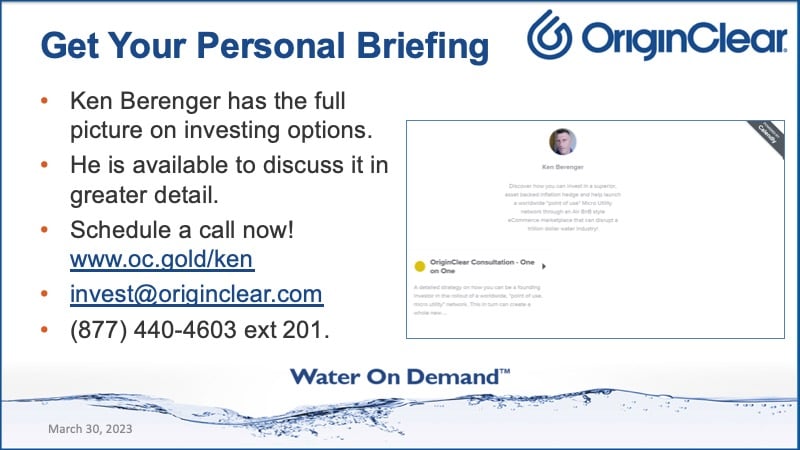
Call Ken
Riggs: I do want to chime in that anyone who is accredited can have a non-disclosure discussion with Ken, because there is very important things to know about what's happening and it's available to the accredited investors. Estrella is doing a wonderful job of representing the crowdfunding side, but there's no real secrets there. It is straightforward. You get a piece, you get a piece of the rock, Water On Demand.
Estrella: Mm hmm.
Ken B: Now it turns out the rock might have water in it.
Riggs: Who knew?
Ken: Who knew?
Riggs: Who knew?
Riggs: What is it? Ringwoodite. Ringwoodite.
Ken B: Ringwoodite. I got to remember that.
Riggs: Estrella, what are we going to say? I'm sorry.
Estrella: Oh, no. I'm just listening. I'm loving. I'm loving this dynamic.
About Censorship
Riggs: Wahoo! So, yeah, I was stunned. And, you know what was interesting, Armstrong Economics is a, you know, it's a research site. For years, I've tracked them and they're featuring TikTok videos because that's the only source of unfiltered news.
Ken B: Right? Right. I can get on his phone and literally, you know, be at the site of a murder. Right. And he can, this is what really, you know, this is what it really looks like. It's not these sanitized after the fact issues. I believe the Ohio derailment, we didn't, national news didn't cover it for what? Days? Days!
Riggs: And they minimized it.
Estrella: Yeah it's actually true. I did not know about it until I got onto my TikTok and I saw everyday people literally show birds falling out of the sky and them being terrified to go to their faucet and grab a glass of water. It, I couldn't believe that I had to go to TikTok to find this out, which is scary.
Ken B: Brian Hallahan yes, you're correct.
Riggs: By design.
Ken B: Um.
Riggs: You have to say what he said, because otherwise you're being mysterious.
Ken B: Well...
Estrella: I just.
Ken B: I don't want to get too. I don't want to get too.
Estrella: I just read it.
Riggs: If you if you react to it, you got to serve the poor people in the webinar.
Ken B: Yeah. And look, Bryan Hallihan believes that this, you know, this diversion of information, you know, the censoring of, you know, kind of the scary stuff is by design.
Riggs: Well, hey guess what? All these hearings about Tiktok and now this bill that's going to shut it down. Hello?
Estrella: Right.
Ken B: Let me tell you something. Be careful when they say they want to come in and help. Okay. Just read the bill, will you? Look, I won't render an opinion. Read the bill. Did you like the Patriot Act? You're going to love this thing.
Being Early
Riggs: All right. We're going to, we're going to shy away because we are, our lane is water and it's controversial enough. I want to thank everyone. I thank you guys for for showing up. And I'll tell you, we are stepping into the eye of the storm here. Our solution, as I said in that podcast in 2016, I was like, well, decentralization. And nobody was like, um, so you know, what is that? And people are like, huh, what? So here's the bottom line. By being early, the event's caught up with us and here we are.
Ken B: Right? Well, look, the thing is being no, it wasn't just that Riggs. It was being early, but remaining consistent. In other words. Okay, nobody's listening. Let me try something else. And there's a temptation to do that. When you were getting these, you know, like the dog that heard the whistle, you know, and when the people were tilting, they're like, What?
One good thing that crypto, cryptocurrency did, not what it did to my bank account, but what it did, what it did was it keyed the world in to what the concept of decentralization, the safety that comes from not having something under centralized control, you know, kind of unhackable. Right? It spent years and years indoctrinating, indoctrinating, through education, I mean, what decentralization is. So when you say decentralized water, now people actually have a pretty strong intuitive sense. Most people, have a pretty strong intuitive sense of what you're talking about.
Most Powerful Asset Class
One thing I don't know if we mentioned last week, Riggs, the gentleman that was in, when they shot to the table, the Mexican gentleman we spoke with, Jorge, we talk about, this is all coming at a time when water is in high focus. Assets become the only thing worth anything. As Daryl was commenting on, currency is worth nothing, you know, in other words, at some point.
But the most vital resource on earth, if properly monetized, is the most powerful asset class in the world. But it's also coming at a time when the reshoring of, you talked about Peter Zeihan right, now, we were talking about Zeihan to Jorge, right?
And we were talking about how eventually, you know, this stuff is all going to come back to Mexico in the United States and Canada, and we were going to be insular because we could produce all our own food and all our own energy. And he said, "No, it's already happening." What did he say? "We are 1,000,000ft² short of manufacturing space on the Mexicali Peninsula." 1,000,000ft² short of what they need, and they're at 110% employment.
Riggs: They're way, way, way.
Ken B: That's happening already.
Audience Participation
Riggs: So great stuff coming. I think we've covered it well. I've got lots of good stuff. James Wright, "I read in the back pages of the Biden bill there's a clause that auto manufacturers have to have a lockout or shut off." Yeah, we could go down. Darrel Polston mentions Senate bill 3571, which is the quote unquote TikTok bill, but it's not. Stefan Davis, "Thanks for the update, Riggs and Ken and Estrella, those are some interesting Instagram posts. Making water hot." So you've made water hot, you're famous. And then James Wright finally, "They add in so much agenda pushing stuff that we never know about." We're staying with water. That's our mission we're going to be doing.
Estrella: Yes.
Riggs: Everyone needs it.
Ken B: That's the one shiny object we can agree on is important.
Riggs: Amen. And as Paul Fetscher points out, "There's literally an ocean of water under the earth's mantle." With that, I want to thank all of you. Have a great night. Next week, we're going to talk about this virtual water thing. Fascinating. I think you'll be amazed at what's going on in the world. All right, everyone, Good night.
Estrella: Awesome. Good night, everyone.
%20250px.png?width=250&height=53&name=OriginClear%20Logo%202019%20(RGB)%20250px.png)



